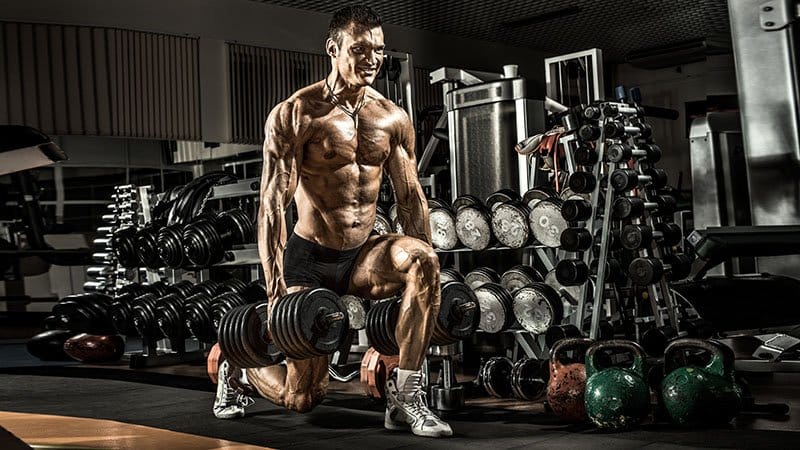
A shredded physique is not complete without strong legs. Your legs contain some of the largest and strongest muscles in the body. Plus, they haul you around all day, so it’s critical they get equal love in the gym. Up your leg-day game with our ultimate leg workout to build strength, mass, and athleticism. It includes compound exercises that let you load up the weight and build strength. Additionally, some of the exercises use resistance to allow you to work your lesser-used muscles to ensure a solid workout across the board. Just for fun, it ends with a real spicy ladder that will burn like fire.
Leg Muscles
The legs consist of dozens of muscles that flex, bend, extend, adduct, abduct, and rotate your legs and allow movement. This ultimate leg workout focuses on four main muscle groups — the quadriceps, hamstrings, glutes, and calves. Understanding how they all fit together and work with each other will ensure you get the most out of your workout.
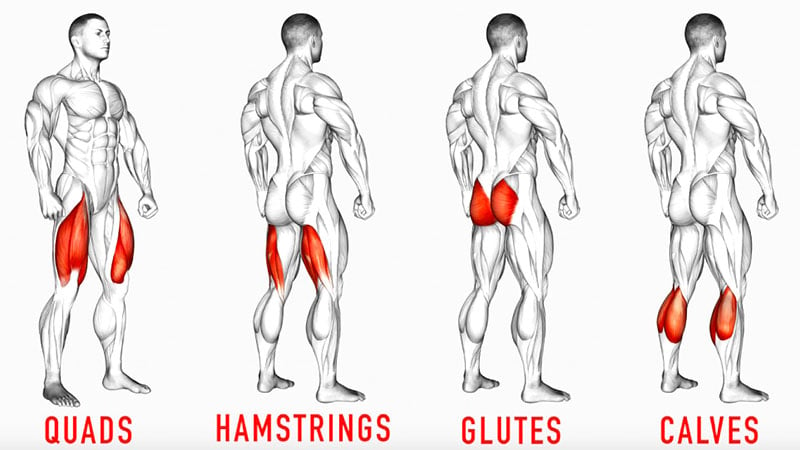
Quadriceps
The quadriceps, or quads, sit at the front of your thigh. Comprised of four muscles, these are the strongest muscles in the human body.
Hamstrings
Sitting at the back of your thigh are the three hamstring muscles. They affect both hip and knee movement.
Glutes
While not technically part of your leg, the glute muscles help facilitate movement in the hips and legs. They’re also regularly engaged when performing leg workouts.
Calves
Facilitating movement in your ankle, foot, and toes are the calf muscles. They sit at the back of your lower leg between the knee and ankle.
Leg Workouts
Jeff Cavaliere has created the perfect workouts for every part of your body, with his ATHLEAN-X program. He has a Masters Degree in Physical Training and is a Certified Strength and Conditioning Specialist, so his workouts are backed by science. Jeff’s resume also boasts time as the Head Physical Therapist and Assistant Strength Coach for the New York Mets. Train your legs like an athlete, and gain strength as well as mass. The ultimate leg workout includes compound movements that target all sections of the legs. Additionally, it incorporates training across the three planes of motion — sagittal (forward and backward), frontal (side to side), and transverse (twisting) — so you’re hitting your legs from every angle.

Leg Exercises
1. Barbell Squats
As always, you should always warm-up before your leg workout. The almighty barbell squat is the first exercise of the day. This is a compound move that engages all the target muscles and lets you load up the weight. You’ll perform the squats as a drop set, reducing the weight as your reps increase. Before getting started, though, you’ll want to ‘lighten the load’ by doing one or two box squats with a weight 10% heavier than your 5RM weight. Doing this will mentally prep you for the move coming, and trick your mind into thinking the first weight of your working isn’t all that heavy. After each set, you’ll also want to decompress the spine. Just hang from an overhead bar for 30 seconds. You’ll want to do the box squats before each working set, and the hang after each as well.
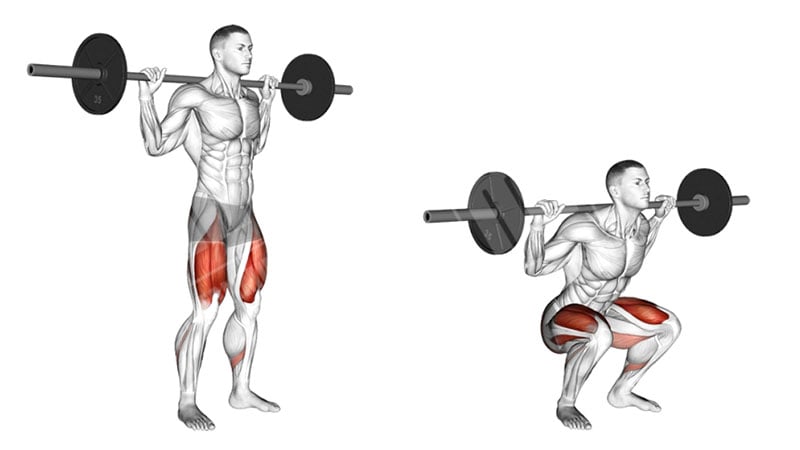
Execution
- Start with the barbell across the back of your shoulders, and feet just wider than hip-width apart, toes pointed slightly out. Additionally, keep your head up and elbows tucked in.
- Bring yourself down until your knees are at 90-degrees.
- For proper form, you’ll want to make sure you’re bringing the barbell down in a straight line. Bend at the hips, pushing your butt backward, but keeping the chest up. If you’re new to working out or unsure about your form, you can perform these as box squats, using the box as a guide.
- Drive-up through the floor, back to standing position.
- Focus on bringing the weight back up in a straight line. Engage your core, moving your hips and chest as one unit. This will make sure you’re not accidentally swinging forward or backward.
- You’ll complete four sets, starting with your heaviest weights. Dropping the weight as you go allows you to shift your focus to reps.
Sets: 4
Reps: 5RM/5RM/10RM/25RM — dropping weight each set
2. Barbell Hip Thrust
Next up, you’re going to hit the posterior chain. This leg workout will focus on your glutes and the hamstrings for a butt so firm you could bounce a coin off it. The barbell hip thrust is another compound move that allows you to load up on the weight. You’ll do this as a reverse drop-set, increasing the weights as you go. Starting with the lower weights will allow you to focus on getting your form and movement pattern correct.
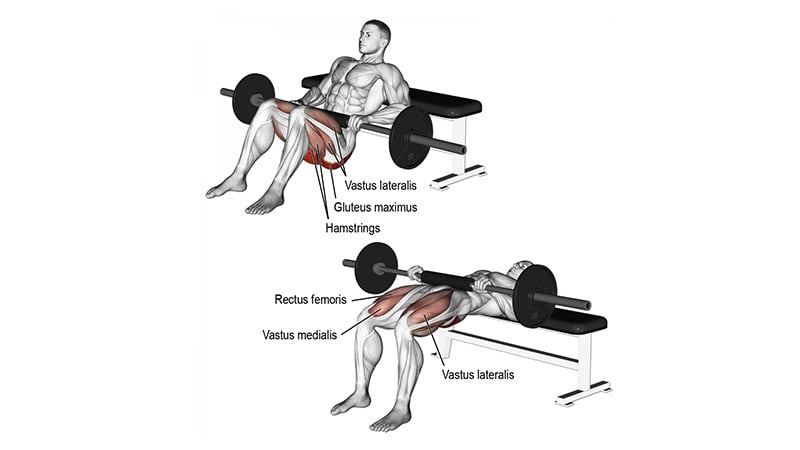
Execution
- Make sure you have a box that won’t move around.
- To set yourself up, start by sitting on the floor in front of your box. Lay your barbell across the front of your hips. Rest your upper back, across the middle of your shoulder blades, along the front edge of the box. Your feet should be flat on the floor, just wider than hip-width apart, with your toes pointed slightly outward. The distance of your feet from the box should allow your knees to be at 90-degrees at the top of the move.
- Push up, focussing on squeezing your glutes until your torso and upper thighs are in a straight line. You should feel a powerful contraction in the glutes and hamstrings. Hold for a few seconds.
- Keep in mind that your hands are there to stabilize the bar, but not to help shift the weight.
- When you’re at the top of the move, be careful not to let your lower back hyperextend. Prevent this by tilting your pelvis forward slightly, and contracting your lower stomach muscles a little bit.
- Bring your hips back down until your bottom is just above the floor.
- You’ll complete four sets, adding weight as each set reduces in reps.
Sets: 4
Reps: 25/10/5/5 — adding weight each set
3a. Bulgarian High/Low Split Squats — Alternating Torso Position
There is a lot to be said for single-leg training. It’s excellent for improving your athleticism and integrates more hip stability in the frontal plane of movement. The next two leg workouts are the same movement, Bulgarian high/low split squats. However, they are performed in different ways. First up, you’ve got squats, that combined with alternating the position of your torso, change the focus from your quads to the posterior chain.
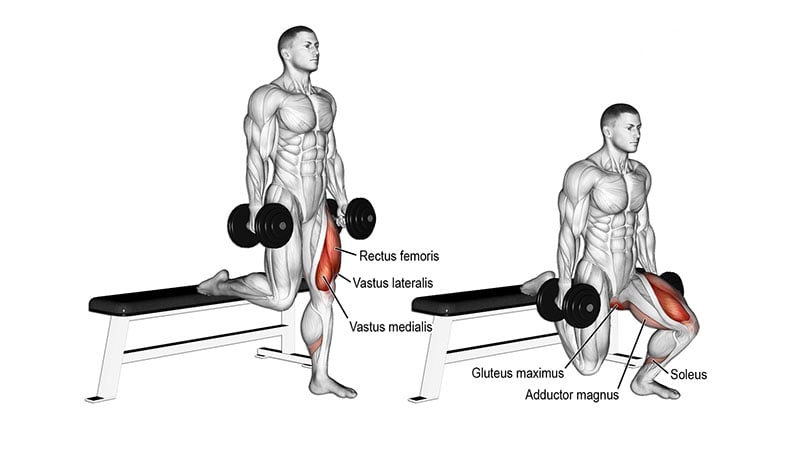
Execution
- Stand with your back to a bench, dumbbells in each hand.
- Place one foot back up on the bench. The other foot should be flat on the floor, far enough away from the bench, that when you squat, that knee is at 90-degrees. The front leg will be bearing most of your weight. The back leg should just be stabilizing you.
- Drop into a squat, lowering your body until your knee is at 90-degrees and dumbbells are nearly on the floor.
- The position of your torso matters a lot in this move, as it dictates what muscle is doing the lion’s share of work. You’ll need to alternate your torso position in the set, to work both your quads and your posterior chain.
- To work the quads, as you lower into the squat, keep your torso straight. To engage the glutes and hamstrings, as you lower into the squat, tilt your body forward over the weight-bearing knee. Alternate one to one as your progress through the set.
- You’ll complete two sets on each leg.
Sets: 2
Reps: 10-12RM on each leg
3b. Bulgarian High/Low Split Squats — Plyometric Hops
Keeping with the Bulgarian high/low split squats, you’ll move into plyometric hops, using just your bodyweight. The goal of this is to increase your speed and athleticism. Varying the pace of your workout ensures you don’t become slow. Additionally, this puts the vastus medialis muscle in the quad group to work. One of the functions of the vastus medialis is to maintain knee stability, so jumping exercises will train that function of the muscle.
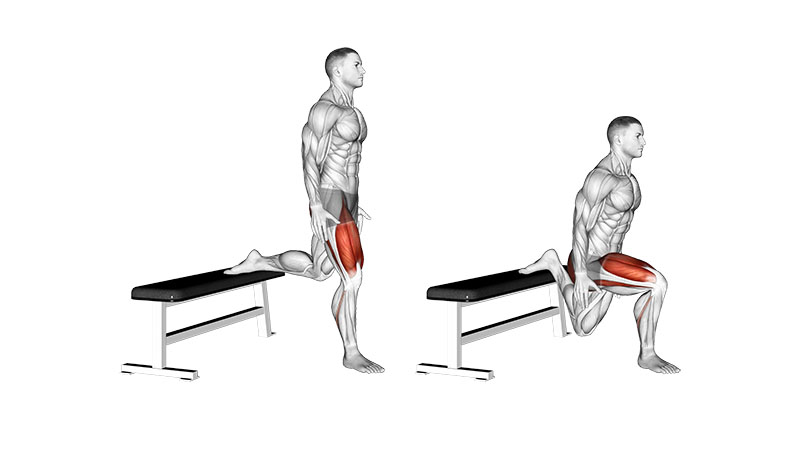
Execution
- Keep your position from the previous exercise; however, you’ll need to ditch the weights.
- To start, drop into a squat.
- At the bottom of the squat, you’ll push explosively off the ground into a jump. Keep your back foot on the bench. The front knee should come up to about belly button height so that you can clap your hands together under that knee. This serves two purposes. One is to make sure you’re jumping high enough. The second is to give yourself a little cheer because these are hard.
- As you land, you’ll drop straight back down into a squat. You can touch your fingers to the ground as you do, to help stabilize your landing.
- You’ll want to focus on trying to land in the same spot you jumped from so that your position and posture are not compromised.
- Repeat until failure on each leg.
Sets: 1
Reps: to failure on each leg
4. Dumbbell TKE Drop Lunge
The dumbbell TKE (terminal knee extension) drop lunge, is another exercise that will shift the focus to work on the vastus medialis, at the inside of the knee. To work a muscle to its full capacity, it needs to go through its full range of motion. As such, to achieve this on the vastus medialis, you need to extend your knee fully, to a locked position. Using the bands in a drop lunge allows you to work against the tension created.
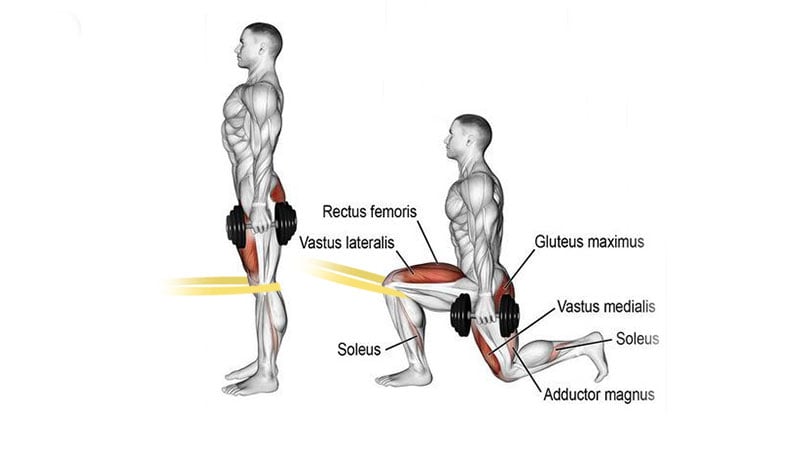
Execution
- Attach your exercise bands very securely to a rack. Remember that the muscles in your legs are some of the largest and strongest in your body, so you’ll need higher resistance bands.
- You’ll also need some dumbbell weights, which you’ll just hold in your hands.
- Take a lunge position. Your front foot will be flat on the ground, and your weight centered over the top. This is the leg that you’ll attach the band to, hooking it behind your knee. The back leg will be far enough back, that at the bottom of your lunge, both knees are at 90-degree.
- Drop down into a lunge, keeping your arms at your sides, torso straight, and core engaged.
- Drive-up from the ground, and as you reach the top of the move, fully extend your leg, locking your knee. Doing so will achieve that full contraction.
- You’ll complete two to three sets on each leg.
Sets: 2-3
Reps: 10-12RM on each leg
5. Weighted Adductor Goblet Squat
For the ultimate in strong, muscular thighs, you need to be working all areas of your upper legs. This includes the inside and outside muscles of your thighs. Dumbbell/Weighted adductor goblet squats are great for engaging your inner thigh muscles. For this, you’ll need a smooth surface that you can slide on in your socks. Feel free to do Tom Cruise’s Risky Business dance to test out the slidey-ness of your chosen surface.
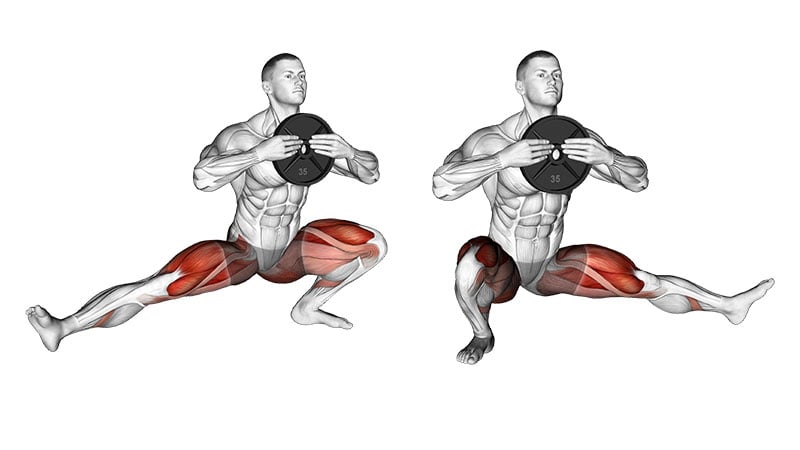
Execution
- Shoes off — you’ll only need to be in your socks for this exercise.
- Grab a dumbbell or weight, which you’ll hold with both hands, at the center of your chest.
- Position your feet just wider than hip-width apart. Put your weight on one leg. The other one will do the sliding.
- Sink into a squat. However, as you do, your weight will remain mostly on the non-sliding leg. The slider will move out from the side of your body.
- At the bottom of the move, to come back up, focus on squeezing your inner thighs together. This will force the activation of the adductors. You don’t want to be stepping or pulling your leg backing, as that won’t work the muscles you want to focus on in this exercise.
- Repeat 10 to 12 times for two sets on each leg.
Sets: 2
Reps: 10-12RM on each leg
6. Hip Band Ladder Finish
End the ultimate leg workout with one final, epic burn. It’s time to work the outside of your thighs — the abductor muscles. This is a weight-free exercise and only uses a resistance band. However, don’t be fooled, this is going to burn like a Carolina Reaper. Be strong, push through.
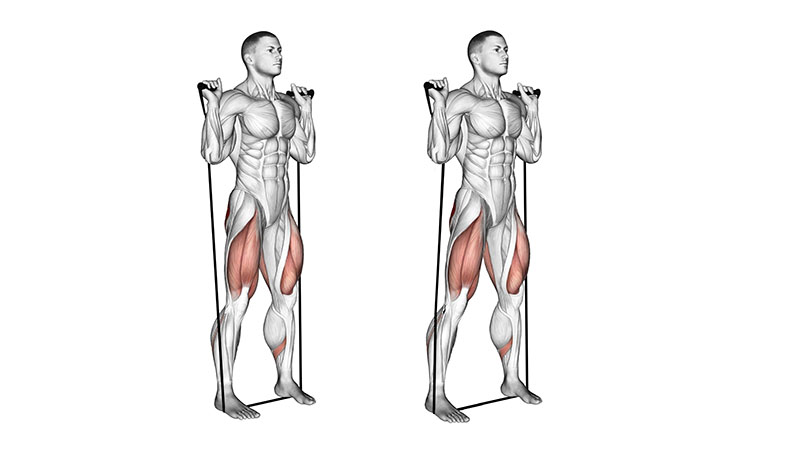
Execution
- Set yourself up with your resistance band. Hook the bottom of the band under your feet, toes pointing straight out in front. The top of the band needs to hook around the outside of your upper arms. To do this, clasp your hands under your chin, holding the band and scoop the band out around your elbows, which should then be perpendicular to your body.
- Keeping the bands under your feet, take one step to the left. Then take one step to the right.
- Repeat, this time taking two steps to the left, then two to the right.
- Repeat with three each way.
- Check your form to make sure your toes aren’t pointing out.
- Continue to repeat the steps each way, increasing by one each time, until you’re at a ladder of 10 going both ways.
Sets: 1 or 2
Reps: Ladder to 10 reps
Leg Workouts FAQs
Is it OK to train legs every day?
Ideally, you only want to train your legs two or three times a week. This gives them time to recover between sessions, which is vital for building strength and mass. You also need to keep in mind that legs contain some of the body's largest muscles, so a good leg session needs adequate repair time. Plus, your legs do a lot of incidental exercise between gym sessions, as they’re responsible for carrying you around every day.
Do leg workouts make your legs bigger?
Your muscles get bigger when you achieve hypertrophy, resulting from the stimulation and repair of weight sessions. As such, weighted leg workouts can make your legs bigger. However, other factors will influence this growth as well, including exercise frequency and intensity, as well as nutrition.
How many leg exercises should you do on leg day?
The ideal number of exercises for leg day is four to six. This will allow a well-rounded workout that focuses on different muscle groups in your legs without overtraining. A good combination of moves includes squats, hip thrusts, Bulgarian high/low split squats, dumbbell TKE drop lunges, adductor goblet squats, and a hip band ladder finish if you’re not feeling enough of a burn.
Are squats enough for leg day?
Squats are great for leg day and should definitely be included as they’re a foundational move. However, squats alone aren’t sufficient for a well-rounded workout. You’re only working one set of muscles in one way. Adding different exercises, along with squats, can give you better, more efficient gains in both strength and mass.
Alexandra Linde is an experienced writer holding a bachelor's degree in Journalism. She is the owner of Alexandra McKiterick Creative and has expertise in travel, fashion, fitness and lifestyle. Alex has previously written for Flightcenter, Travello, and Backpacker Deals.
SUBSCRIBE TO OUR NEWSLETTER
Subscribe to our mailing list and get interesting stuff and updates to your email inbox.
